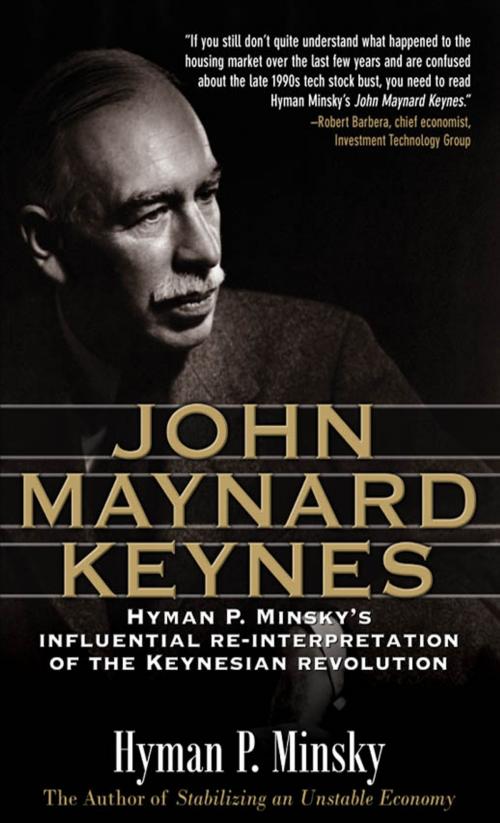John Maynard Keynes
Business & Finance, Human Resources & Personnel Management, Training, Management & Leadership, Management| Author: | Hyman P. Minsky | ISBN: | 9780071593021 |
| Publisher: | McGraw-Hill Education | Publication: | May 1, 2008 |
| Imprint: | McGraw-Hill Education | Language: | English |
| Author: | Hyman P. Minsky |
| ISBN: | 9780071593021 |
| Publisher: | McGraw-Hill Education |
| Publication: | May 1, 2008 |
| Imprint: | McGraw-Hill Education |
| Language: | English |
“Today, Mr. Minsky's view [of economics] is more relevant than ever.”- The New York Times
“Indeed, the Minsky moment has become a fashionable catch phrase on Wall Street.”-The Wall Street Journal
John Maynard Keynes offers a timely reconsideration of the work of the revered economics icon. Hyman Minsky argues that what most economists consider Keynesian economics is at odds with the major points of Keynes's The General Theory of Employment, Interest, and Money. Keynes and Minsky refuse to ignore pervasive uncertainty. Once uncertainty is given center stage, recurring episodes of financial system crises are all but inescapable. As Robert Barbera notes in a new preface, “Benign economic circumstances…invite increasingly aggressive financial market wagers. Innovation in finance is a signature development in a capitalist economy. Once leveraged wagers are in place, small disappointments can have exaggerated consequences.” Thus for Minsky economic calm on Main Street engenders financial system fragility which, in turn, ensures a perpetuation of boom and bust cycles.
Minsky colleagues Dimitri B. Papadimitriou and L. Randall Wray write in a new introduction, “We offer this new edition, in the hope that it will contribute to the reformation of economic theory so that it can address the world in which we actually live-the world that was always the topic of Minsky's analysis.”
“Today, Mr. Minsky's view [of economics] is more relevant than ever.”- The New York Times
“Indeed, the Minsky moment has become a fashionable catch phrase on Wall Street.”-The Wall Street Journal
John Maynard Keynes offers a timely reconsideration of the work of the revered economics icon. Hyman Minsky argues that what most economists consider Keynesian economics is at odds with the major points of Keynes's The General Theory of Employment, Interest, and Money. Keynes and Minsky refuse to ignore pervasive uncertainty. Once uncertainty is given center stage, recurring episodes of financial system crises are all but inescapable. As Robert Barbera notes in a new preface, “Benign economic circumstances…invite increasingly aggressive financial market wagers. Innovation in finance is a signature development in a capitalist economy. Once leveraged wagers are in place, small disappointments can have exaggerated consequences.” Thus for Minsky economic calm on Main Street engenders financial system fragility which, in turn, ensures a perpetuation of boom and bust cycles.
Minsky colleagues Dimitri B. Papadimitriou and L. Randall Wray write in a new introduction, “We offer this new edition, in the hope that it will contribute to the reformation of economic theory so that it can address the world in which we actually live-the world that was always the topic of Minsky's analysis.”















